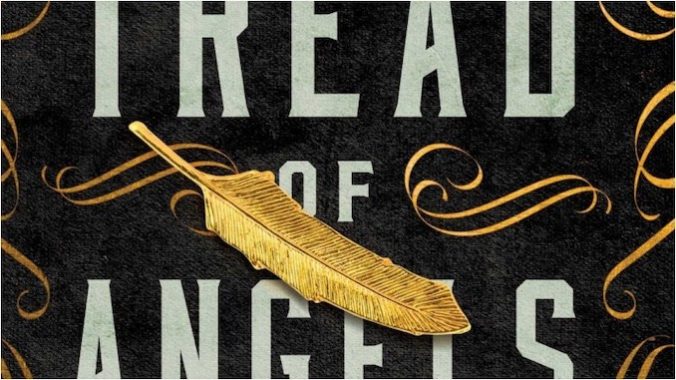Tread of Angels: A Fairly Basic Mystery Bolstered by Phenomenal Worldbuilding

An immersive and surprisingly dark historical fantasy, Rebecca Roanhorse’s Tread of Angels revolves around a fairly basic mystery built with classic Western themes and tropes. But, as anyone who has read her Between the Earth and Sky trilogy can tell you, what sets her work apart is deft, thorough worldbuilding, which makes this tale feel as though it’s a part of a much larger whole, just one of the many things both good and bad happening in a much larger world, full of concurrent stories we’re just not looking directly at. (What I’m saying is, this is the sort of fully realized setting that deserves many, many sequels, spinoffs, and standalones set in its streets.)
The story takes place in the Colorado town of Goetia, an alternate version of the Old West that boasts serious steampunk vibes and lots of biblical imagery, as miners extract the element known as “divinity” from a nearby mountain range (that’s actually the long dead corpse of an angel called Abaddon). Here, society is divided into two classes: the Elect and the Fallen. The Elect are descendants of angels like Abaddon and those who fought alongside him, while the Fallen trace their ancestry to the demons who followed Lucifer and rebelled against God. In Goetia, the Virtues enforce holy justice as the Elect townsfolk gleefully discriminate and ostracize against the Fallen, despite the fact that the latter are necessary for extracting the very divinity that powers their high society luxuries.
Tread of Angels follows the story of Celeste Semyaza, a half-Fallen, half-Elect card dealer eking out a living in a local gambling den because she refuses to live a life “passing” as one of the town’s upper class. (Celeste’s attempt to come to terms with the warring sides of herself is but one of several fascinating plot threads you’ll wish Roanhorse had spent more time on.) Her Fallen sister Mariel headlines the club as a singer, but when she’s arrested one night on suspicion of murdering a Virtue, Celeste’s life is turned upside down. Determined to prove her sister innocent, she’s willing to do whatever it takes, from taking on the role of her official advocate during her trial to accepting help from her former demon lover Abraxas.
To be fair, the question of Mariel’s innocence is the least interesting part of this book, and most of the Elect presumed she was guilty of something long before she was ever arrested for a crime. But Celeste’s search to prove her sister’s innocence takes her deep into the world of Elect politics and she uncovers some dark secrets and uncomfortable truths along the way—about the town she lives in and about herself.
-

-

-

-

-

-

-

-

-

-

-

-

-

-

-

-

-

-

-

-

-

-

-

-

-

-

-

-

-

-

-

-

-

-

-

-

-

-

-

-








































